History Assignment on British Raj, Orientalism, and Hinduism
VerifiedAdded on 2023/06/08
|5
|898
|394
Homework Assignment
AI Summary
This history assignment explores the multifaceted impact of British rule in India, delving into the three waves of British influence, the motivations behind their colonial endeavors, and the role of caste in facilitating their profit-driven agenda. It examines the concept of Orientalism and its relationship to Western perspectives on the East, contrasting it with Occidentalism. The assignment further investigates the popularization of the Bhagavad Gita in the West, the influence of Christianity on Hinduism, and the impact of Western knowledge on Hindu society. It also discusses the views of Indologist Doniger on Kipling's portrayal of India and the British Raj. The assignment utilizes scholarly sources to support its analysis of these historical events and their consequences.
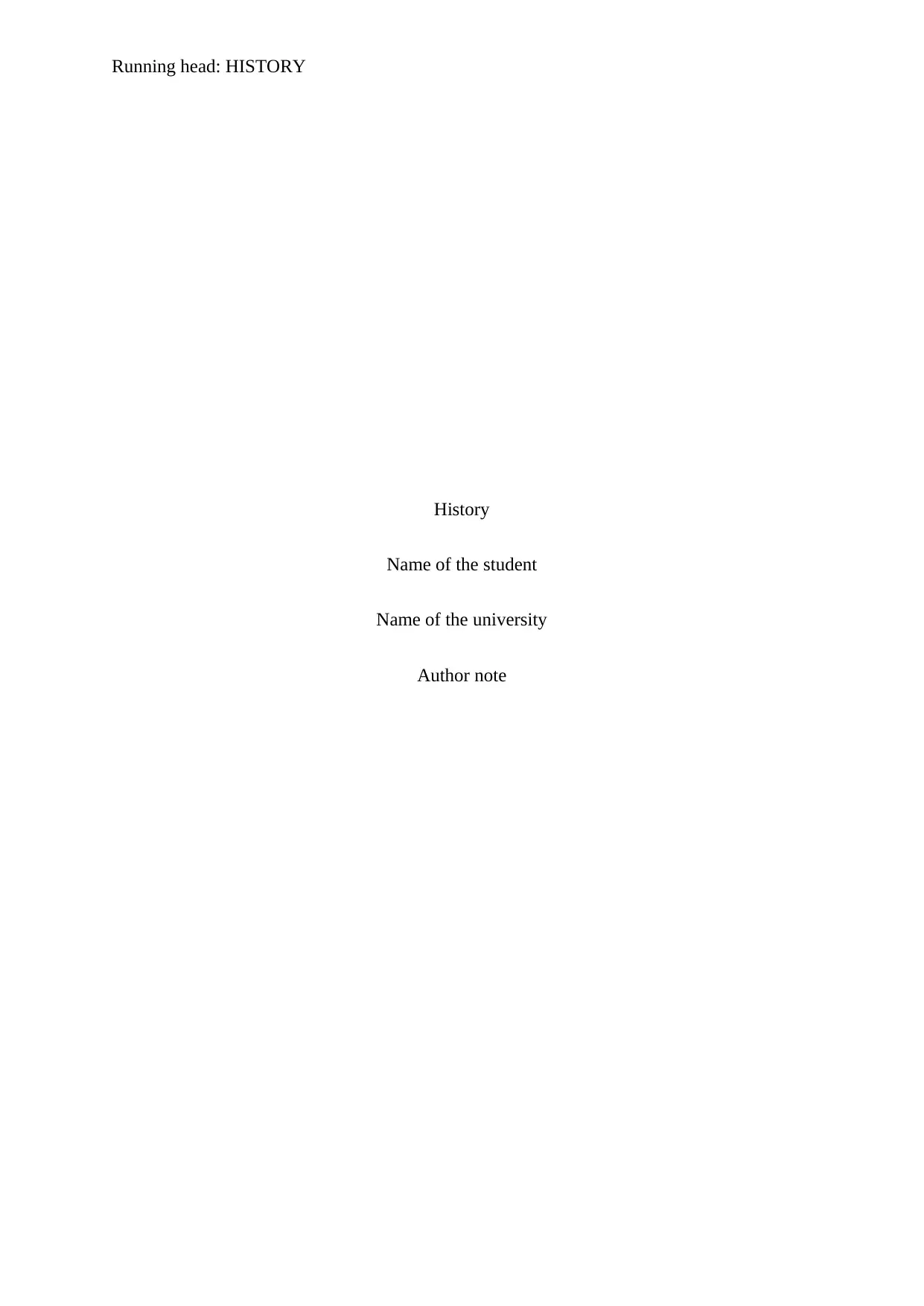
Running head: HISTORY
History
Name of the student
Name of the university
Author note
History
Name of the student
Name of the university
Author note
Paraphrase This Document
Need a fresh take? Get an instant paraphrase of this document with our AI Paraphraser
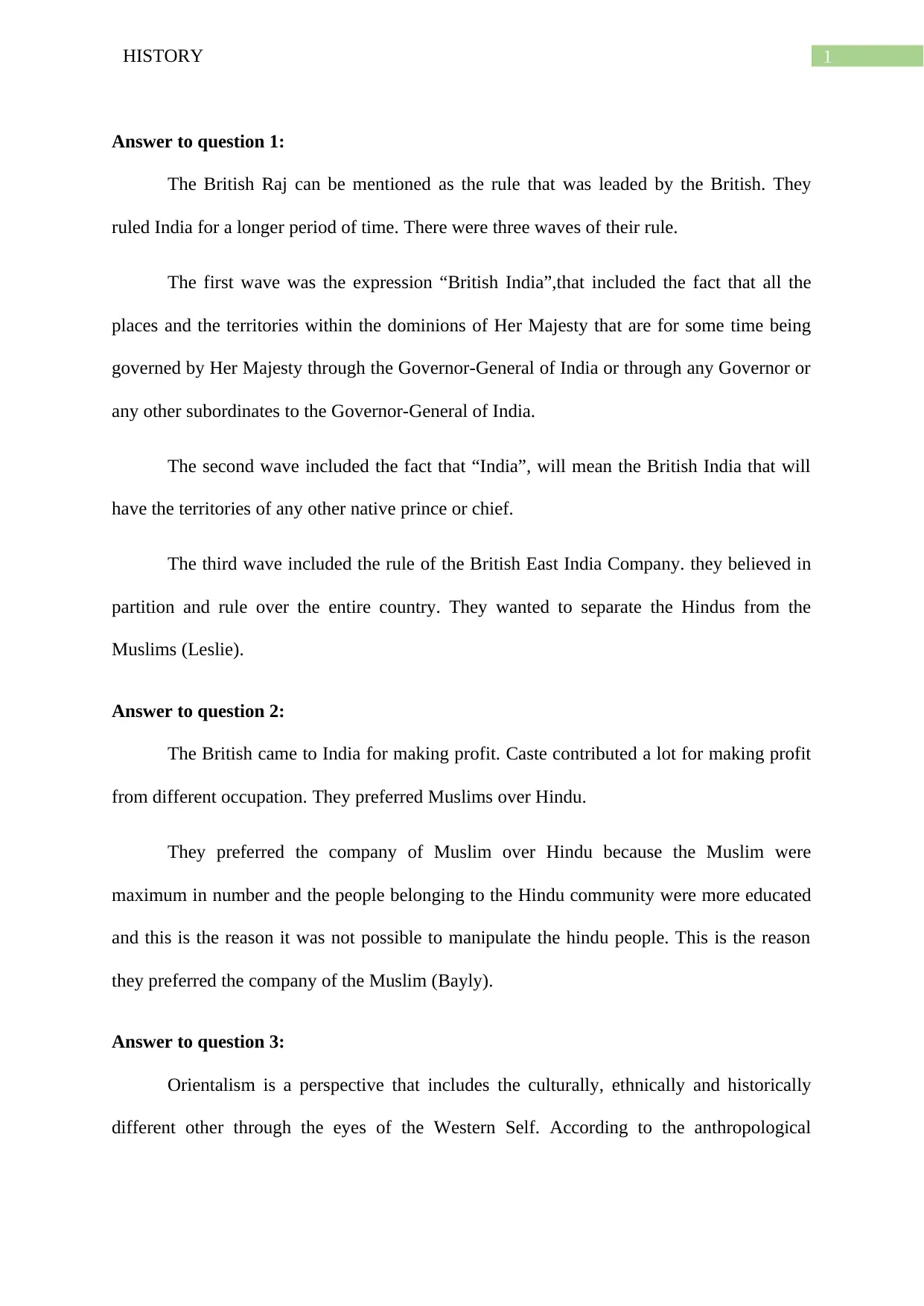
1HISTORY
Answer to question 1:
The British Raj can be mentioned as the rule that was leaded by the British. They
ruled India for a longer period of time. There were three waves of their rule.
The first wave was the expression “British India”,that included the fact that all the
places and the territories within the dominions of Her Majesty that are for some time being
governed by Her Majesty through the Governor-General of India or through any Governor or
any other subordinates to the Governor-General of India.
The second wave included the fact that “India”, will mean the British India that will
have the territories of any other native prince or chief.
The third wave included the rule of the British East India Company. they believed in
partition and rule over the entire country. They wanted to separate the Hindus from the
Muslims (Leslie).
Answer to question 2:
The British came to India for making profit. Caste contributed a lot for making profit
from different occupation. They preferred Muslims over Hindu.
They preferred the company of Muslim over Hindu because the Muslim were
maximum in number and the people belonging to the Hindu community were more educated
and this is the reason it was not possible to manipulate the hindu people. This is the reason
they preferred the company of the Muslim (Bayly).
Answer to question 3:
Orientalism is a perspective that includes the culturally, ethnically and historically
different other through the eyes of the Western Self. According to the anthropological
Answer to question 1:
The British Raj can be mentioned as the rule that was leaded by the British. They
ruled India for a longer period of time. There were three waves of their rule.
The first wave was the expression “British India”,that included the fact that all the
places and the territories within the dominions of Her Majesty that are for some time being
governed by Her Majesty through the Governor-General of India or through any Governor or
any other subordinates to the Governor-General of India.
The second wave included the fact that “India”, will mean the British India that will
have the territories of any other native prince or chief.
The third wave included the rule of the British East India Company. they believed in
partition and rule over the entire country. They wanted to separate the Hindus from the
Muslims (Leslie).
Answer to question 2:
The British came to India for making profit. Caste contributed a lot for making profit
from different occupation. They preferred Muslims over Hindu.
They preferred the company of Muslim over Hindu because the Muslim were
maximum in number and the people belonging to the Hindu community were more educated
and this is the reason it was not possible to manipulate the hindu people. This is the reason
they preferred the company of the Muslim (Bayly).
Answer to question 3:
Orientalism is a perspective that includes the culturally, ethnically and historically
different other through the eyes of the Western Self. According to the anthropological
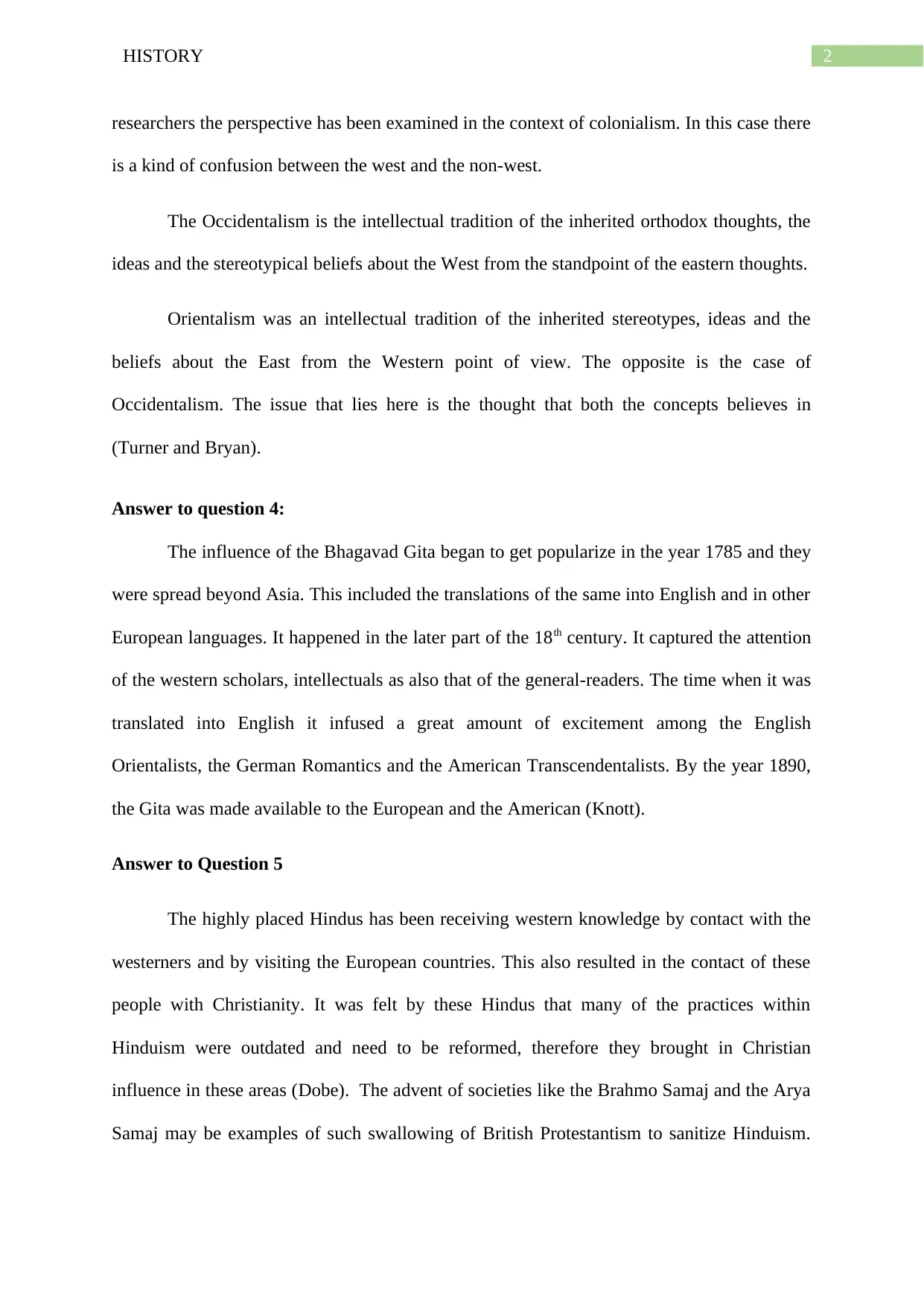
2HISTORY
researchers the perspective has been examined in the context of colonialism. In this case there
is a kind of confusion between the west and the non-west.
The Occidentalism is the intellectual tradition of the inherited orthodox thoughts, the
ideas and the stereotypical beliefs about the West from the standpoint of the eastern thoughts.
Orientalism was an intellectual tradition of the inherited stereotypes, ideas and the
beliefs about the East from the Western point of view. The opposite is the case of
Occidentalism. The issue that lies here is the thought that both the concepts believes in
(Turner and Bryan).
Answer to question 4:
The influence of the Bhagavad Gita began to get popularize in the year 1785 and they
were spread beyond Asia. This included the translations of the same into English and in other
European languages. It happened in the later part of the 18th century. It captured the attention
of the western scholars, intellectuals as also that of the general-readers. The time when it was
translated into English it infused a great amount of excitement among the English
Orientalists, the German Romantics and the American Transcendentalists. By the year 1890,
the Gita was made available to the European and the American (Knott).
Answer to Question 5
The highly placed Hindus has been receiving western knowledge by contact with the
westerners and by visiting the European countries. This also resulted in the contact of these
people with Christianity. It was felt by these Hindus that many of the practices within
Hinduism were outdated and need to be reformed, therefore they brought in Christian
influence in these areas (Dobe). The advent of societies like the Brahmo Samaj and the Arya
Samaj may be examples of such swallowing of British Protestantism to sanitize Hinduism.
researchers the perspective has been examined in the context of colonialism. In this case there
is a kind of confusion between the west and the non-west.
The Occidentalism is the intellectual tradition of the inherited orthodox thoughts, the
ideas and the stereotypical beliefs about the West from the standpoint of the eastern thoughts.
Orientalism was an intellectual tradition of the inherited stereotypes, ideas and the
beliefs about the East from the Western point of view. The opposite is the case of
Occidentalism. The issue that lies here is the thought that both the concepts believes in
(Turner and Bryan).
Answer to question 4:
The influence of the Bhagavad Gita began to get popularize in the year 1785 and they
were spread beyond Asia. This included the translations of the same into English and in other
European languages. It happened in the later part of the 18th century. It captured the attention
of the western scholars, intellectuals as also that of the general-readers. The time when it was
translated into English it infused a great amount of excitement among the English
Orientalists, the German Romantics and the American Transcendentalists. By the year 1890,
the Gita was made available to the European and the American (Knott).
Answer to Question 5
The highly placed Hindus has been receiving western knowledge by contact with the
westerners and by visiting the European countries. This also resulted in the contact of these
people with Christianity. It was felt by these Hindus that many of the practices within
Hinduism were outdated and need to be reformed, therefore they brought in Christian
influence in these areas (Dobe). The advent of societies like the Brahmo Samaj and the Arya
Samaj may be examples of such swallowing of British Protestantism to sanitize Hinduism.
⊘ This is a preview!⊘
Do you want full access?
Subscribe today to unlock all pages.

Trusted by 1+ million students worldwide
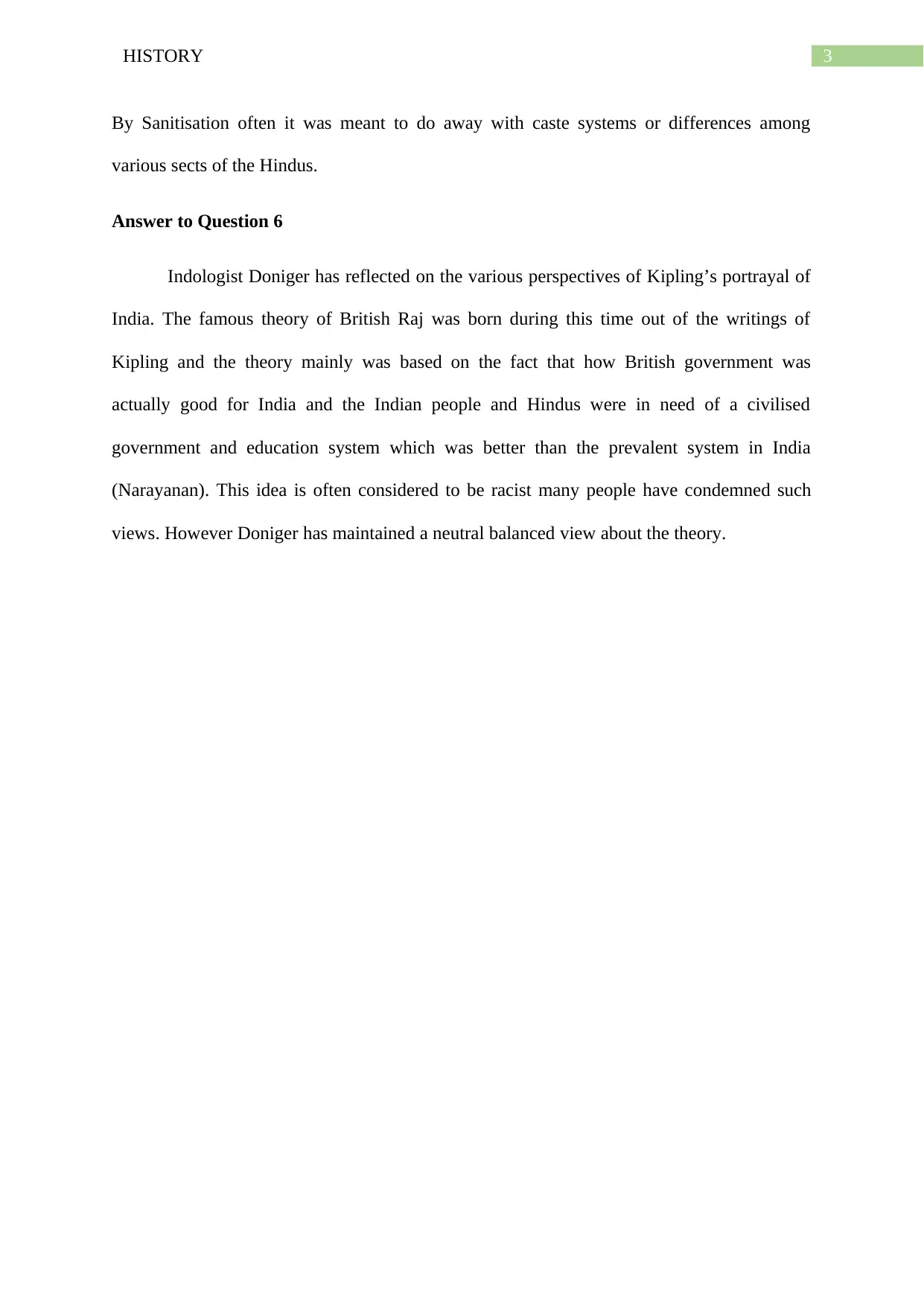
3HISTORY
By Sanitisation often it was meant to do away with caste systems or differences among
various sects of the Hindus.
Answer to Question 6
Indologist Doniger has reflected on the various perspectives of Kipling’s portrayal of
India. The famous theory of British Raj was born during this time out of the writings of
Kipling and the theory mainly was based on the fact that how British government was
actually good for India and the Indian people and Hindus were in need of a civilised
government and education system which was better than the prevalent system in India
(Narayanan). This idea is often considered to be racist many people have condemned such
views. However Doniger has maintained a neutral balanced view about the theory.
By Sanitisation often it was meant to do away with caste systems or differences among
various sects of the Hindus.
Answer to Question 6
Indologist Doniger has reflected on the various perspectives of Kipling’s portrayal of
India. The famous theory of British Raj was born during this time out of the writings of
Kipling and the theory mainly was based on the fact that how British government was
actually good for India and the Indian people and Hindus were in need of a civilised
government and education system which was better than the prevalent system in India
(Narayanan). This idea is often considered to be racist many people have condemned such
views. However Doniger has maintained a neutral balanced view about the theory.
Paraphrase This Document
Need a fresh take? Get an instant paraphrase of this document with our AI Paraphraser
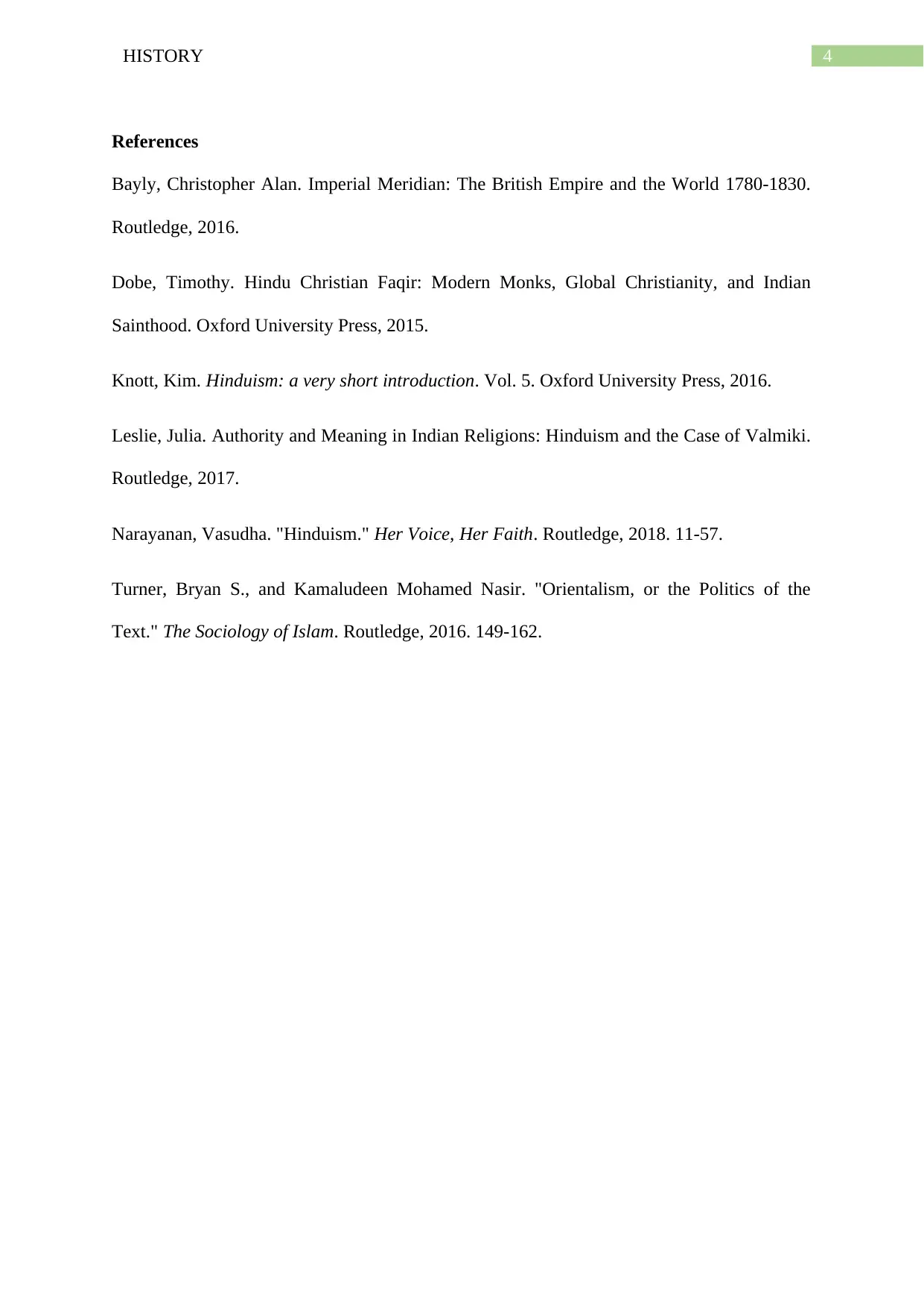
4HISTORY
References
Bayly, Christopher Alan. Imperial Meridian: The British Empire and the World 1780-1830.
Routledge, 2016.
Dobe, Timothy. Hindu Christian Faqir: Modern Monks, Global Christianity, and Indian
Sainthood. Oxford University Press, 2015.
Knott, Kim. Hinduism: a very short introduction. Vol. 5. Oxford University Press, 2016.
Leslie, Julia. Authority and Meaning in Indian Religions: Hinduism and the Case of Valmiki.
Routledge, 2017.
Narayanan, Vasudha. "Hinduism." Her Voice, Her Faith. Routledge, 2018. 11-57.
Turner, Bryan S., and Kamaludeen Mohamed Nasir. "Orientalism, or the Politics of the
Text." The Sociology of Islam. Routledge, 2016. 149-162.
References
Bayly, Christopher Alan. Imperial Meridian: The British Empire and the World 1780-1830.
Routledge, 2016.
Dobe, Timothy. Hindu Christian Faqir: Modern Monks, Global Christianity, and Indian
Sainthood. Oxford University Press, 2015.
Knott, Kim. Hinduism: a very short introduction. Vol. 5. Oxford University Press, 2016.
Leslie, Julia. Authority and Meaning in Indian Religions: Hinduism and the Case of Valmiki.
Routledge, 2017.
Narayanan, Vasudha. "Hinduism." Her Voice, Her Faith. Routledge, 2018. 11-57.
Turner, Bryan S., and Kamaludeen Mohamed Nasir. "Orientalism, or the Politics of the
Text." The Sociology of Islam. Routledge, 2016. 149-162.
1 out of 5
Your All-in-One AI-Powered Toolkit for Academic Success.
+13062052269
info@desklib.com
Available 24*7 on WhatsApp / Email
![[object Object]](/_next/static/media/star-bottom.7253800d.svg)
Unlock your academic potential
Copyright © 2020–2026 A2Z Services. All Rights Reserved. Developed and managed by ZUCOL.